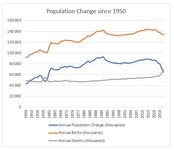Most people now live in countries where two or fewer children are born for every two adults. If all people in the United States today lived through their reproductive years and had babies at an average pace, then it would add up to about 1.66 births per woman. In Europe, that number is 1.5; in East Asia, 1.2; in Latin America, 1.9. Any worldwide average of fewer than two children per two adults means our population shrinks and in the
long run each new generation is smaller than the one before. If the world’s fertility rate were the same as in the United States today, then the global population would fall from a peak of around 10 billion to
less than two billion about 300 years later, over perhaps 10 generations. And if family sizes remained small, we would continue declining.
What would happen as a consequence? Over the past 200 years, humanity’s population growth has gone hand in hand with
profound advances in living standards and health: longer lives, healthier children, better education, shorter workweeks and many more improvements. Our period of progress began recently, bringing the discovery of antibiotics, the invention of electric lightbulbs, video calls with Grandma and the possibility of
eradicating Guinea worm disease. In this short period, humanity has been large and growing.
Economists who study growth and progress don’t think this is a coincidence. Innovations and discoveries are made by people. In a world with fewer people in it, the loss of so much human potential may
threaten humanity’s continued path toward better lives.
Whenever low birthrates get public attention, chances are somebody is concerned about what it means for international competition, immigration or a government’s fiscal challenges over the coming decades as the population ages. But that’s thinking too small. A depopulating world is a big change that we all face together. It’s bigger than geopolitical advantage or government budgets. It’s much bigger than nationalistic worries over which country or culture might manage to eke out a population decline that’s a little bit slower than its neighbors’.

